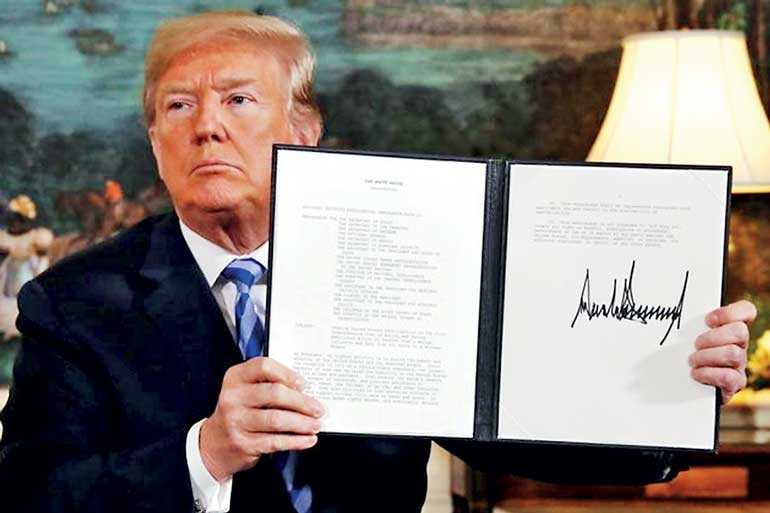Saturday Feb 21, 2026
Saturday Feb 21, 2026
Thursday, 10 May 2018 00:00 - - {{hitsCtrl.values.hits}}

WASHINGTON (Reuters): President Donald Trump on Tuesday pulled the United States out of an international nuclear deal with Iran, raising the risk of conflict in the Middle East, upsetting European allies and casting uncertainty over global oil supplies.
Trump said in a televised address from the White House that he would reimpose US economic sanctions on Iran to undermine “a horrible one-sided deal that should have never, ever been made.”
The 2015 agreement, worked out by the United States, five other world powers and Iran, lifted sanctions on Iran in exchange for Tehran limiting its nuclear program. The pact was designed to prevent Iran from obtaining a nuclear bomb.
But Trump complains that the accord, the signature foreign policy achievement of his Democratic predecessor, Barack Obama, does not address Iran’s ballistic missile program, its nuclear activities beyond 2025 or its role in conflicts in Yemen and Syria.
Iran has extended its political and military influence in the Middle East in recent years, deeply worrying US allies Israel and Saudi Arabia.
Underscoring the tension in the region, the Israeli military went on high alert on Tuesday for a possible flare-up with neighbouring Syria, which is allied to Iran.
An Israeli air strike targeted a Syrian army position south of Damascus on Tuesday but caused no casualties, a commander in the regional alliance supporting Syrian President Bashar al-Assad told Reuters.
Abandoning the Iran pact was the latest element of Trump’s high-stakes “America First” policy, which has led the United States to announce its withdrawal from the Paris climate accord, come close to a trade war with China and pull out of an Asian-Pacific trade deal.
Iranian President Hassan Rouhani said on Tuesday that Iran would remain in the deal without Washington.
Iranian state television said Trump’s decision to withdraw was “illegal, illegitimate and undermines international agreements.”
Renewing sanctions would make it much harder for Iran to sell its oil abroad or use the international banking system.
Iran is the third-largest member of the Organization of the Petroleum Exporting Countries and pumps about 3.8 million barrels per day of crude, or just under 4 percent of global supply. China, India, Japan and South Korea buy most of its 2.5 million bpd of exports.
According to the US Treasury, sanctions related to Iran’s energy, auto and financial sectors will be reimposed in three and six months.
Oil prices recouped some losses after Trump’s announcement, in a volatile session in which prices slumped as much as 4 percent earlier in the day.
Brent crude futures LCOc1 settled 1.7 percent lower at $74.85 a barrel, while US West Texas Intermediate (WTI) crude futures CLc1 ended the session 2.4 percent lower at $69.06 per barrel.
Wall Street remained in negative territory, while energy stocks cut earlier losses after Trump spoke.
Rotten deal
Trump said the nuclear agreement did not prevent Iran from cheating and continuing to pursue nuclear weapons.
“It is clear to me that we cannot prevent an Iranian nuclear bomb under the decaying and rotten structure of the current agreement,” he said. “The Iran deal is defective at its core.”
Iran denies it has tried to build atomic weapons and says its nuclear programme is for peaceful purposes. UN inspectors say Iran has not broken the nuclear deal and senior US officials themselves have said several times that Iran is in technical compliance with the pact.
Trump said he was willing to negotiate a new deal with Iran, but Tehran already has ruled that out and threatened unspecified retaliation if Washington pulled out.
Trump’s decision is a snub to European allies such as France, Britain and Germany that are also part of the Iran deal and tried hard to convince the US president to preserve it. The Europeans must now scramble to decide their own course of action with Tehran.
China and Russia also are signatories to the Iran deal.
The leaders of Britain, Germany and France said in a joint statement that Trump’s decision was a cause for “regret and concern.”
They urged the United States not to take steps that would make life harder for other countries that still wanted to stick to the nuclear deal with Iran.
Obama described Trump’s decision to withdraw from the deal, known formally as the JCPOA, as “misguided.”
“I believe that the decision to put the JCPOA at risk without any Iranian violation of the deal is a serious mistake,” Obama said in a statement.
Iran’s growing military and political power in Yemen, Syria, Lebanon and Iraq worries the United States, Israel and US Arab allies such as Saudi Arabia.
Israel has traded blows with Iranian forces in Syria since February, stirring concern that major escalation could be looming.
The Israeli military said on Tuesday that after identifying “irregular activity” by Iranian forces in Syria, it instructed civic authorities on the Golan Heights to ready bomb shelters, deployed new defences and mobilised some reservist forces.
Prime Minister Benjamin Netanyahu made a televised address lauding Trump’s Iran policy and alluding to the tensions over Syria.
“For months now, Iran has been transferring lethal weaponry to its forces in Syria, with the purpose of striking at Israel,” Netanyahu said. “We will respond mightily to any attack on our territory.”
Saudi Arabia, Iran’s arch-foe in the Middle East, also welcomed Trump’s decision.
ANKARA (Reuters): Turkish President Tayyip Erdogan said the United States will be the loser from President Donald Trump’s decision to withdraw from the nuclear pact with Iran, state broadcaster TRT Haber on Wednesday reported him as telling CNN.
The TRT Haber report cited him as saying that the United States was not remaining faithful to the agreement it had reached.